|
Site has been deprecated since March 2007
|
|
|
|
|
|
Shifting baselines and the decline of pelagic sharks in the Gulf of MexicoJulia Baum and Ransom A. Myers
Ecology Letters, February 2004 | 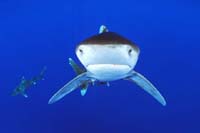 | Less than 1% of oceanic whitetip sharks - thought to have been the most common warm-water oceanic shark just fifty years ago - remain in the Gulf of Mexico today. "This tragedy is caused by continued overfishing and the demand for a single luxury item - sharkfin soup," says Dr. Ransom Myers, a world-leading fisheries biologist based at Dalhousie University in Halifax.
GO TO THE WEBSITE |
Hatcheries and Endangered SalmonR.A. Myers, S.A. Levin, R. Lande, F.C. James, W.W. Murdoch, and R.T. Paine
Science, March 2004 | 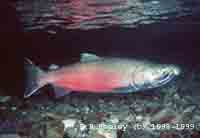 | Many of the wild salmon populations currently protected under the Endangered Species Act in the Northwest are in immediate danger of being delisted--not because they are recovering--but because their presence and status may block development. | | Paper | | Press release | Supplementary material | | 1) Hatcheries and Salmon | | 2) Related links | 3) Union of Concerned Scientists' website:
Deleting Scientific Advice on Endangered Salmon |
ICCAT Bans Shark Finning
November 2004
| 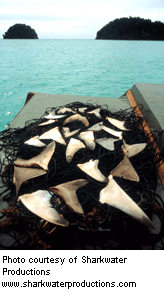 | Concerns about the destructive practice of catching sharks for their fins has led the International Commission for the Conservation of Atlantic Tunas (ICCAT) to ban shark finning in the Atlantic. Shark fins are a highly-valued commodity because they are used to make shark fin soup, a delicacy in some Asian cuisines. However, research by the Myers lab has raised concern about the future of many shark populations globally, helping to create the scientific impetus for this much-needed conservation action. The ICCAT decision applies to all 60 ICCAT-member nations targeting many large pelagic fishes in the Atlantic. Other initiatives proposed by ICCAT to protect sharks include: improved data collection on shark populations, encouraging science and conservation measures to reduce shark bycatch, and a commitment to reassess the status of shortfin mako(Isurus oxyrinchus) by 2005 and to reassess blue shark (Prionaca glauca) and shortfin mako by 2007.
|
Scientists Designate Canada's Porbeagle "Endangered"
May 2004 | 
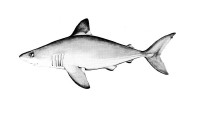 | The Committee on the Status of Endangered Wildlife in Canada (COSEWIC) has designated the porbeagle shark (Lamna nasus) as "endangered." If this designation is formally accepted to the Species at Risk Act, it will mean that measures must be taken to protect the species from extinction. The assessment of the Canadian porbeagle population, authored by Julia Baum (.pdf), states that the species is currently at 11% of the its abundance when fishing began in the early 1960’s. The main source of mortality of porbeagles in the Northwest Atlantic is fishing, which is being carried out at rates that exceed the population growth rate.
| |
CITES Restricts Trade in Great White Sharks
October 2004 | 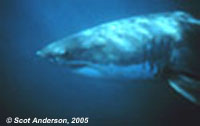 | After a two week meeting in Thailand, the Convention on International Trade in Endangered Species of Wild Fauna and Flora (CITES) added the great white shark (Carcharodon carcharias) to its Appendix II Listing. This designation means that trade in great white sharks is restricted and that countries wishing to trade great white products will need to prove that their exploitation will not damage the species.
|
|
|
|
|
| |